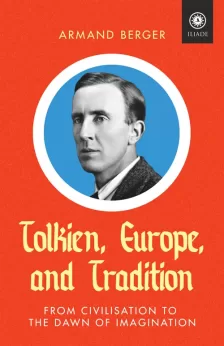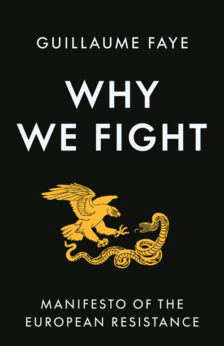Tolkien, Europe, and Tradition, by Armand Berger, is another volume in the Iliade Institute-Arktos collection. Berger offers a fascinating exploration of J.R.R. Tolkien’s literary works through the lens of European mythology, history, and cultural traditions. This concise yet insightful volume provides a compelling analysis of how Tolkien drew upon and reimagined the rich heritage of European folklore, languages, and heroic epics to create his intricate fictional world of Middle-earth.
Berger’s work stands out for its erudite examination of Tolkien’s deep knowledge of European languages and literature, particularly Old English, Norse, Celtic, and Classical traditions. The author masterfully traces the connections between Tolkien’s invented languages, mythologies, and cultures and their real-world inspirations from across the European tradition. For example, Berger illuminates how Tolkien’s conception of the Elves was influenced by both Shakespearean portrayals and older Norse and Germanic folklore, while also becoming something uniquely Tolkienian.
One of the book’s greatest strengths is how it contextualizes Tolkien’s creative project within his academic career as a philologist and scholar of medieval literature. Berger shows how Tolkien’s expertise in historical linguistics and ancient texts directly informed his world-building and story-crafting in works like The Silmarillion and The Lord of the Rings. The author makes a convincing case that Tolkien’s goal was not merely to write entertaining fantasy, but to create a new mythology for England that would fill what he perceived as a gap in England’s native legendary traditions.
Berger’s analysis is particularly illuminating when exploring how Tolkien drew upon and transformed specific mythological and literary motifs. The parallels drawn between the fall of Númenor and the Atlantis myth, or between Aragorn and figures like Hamlet or King Arthur, reveal the depth of Tolkien’s engagement with European storytelling traditions. At the same time, Berger shows how Tolkien made these ancient themes and archetypes resonate with modern readers through his focus on ordinary heroes like hobbits.
The book also offers thought-provoking reflections on how Tolkien’s works engage with themes of ecology, heroism, and the struggle between tradition and modernity. Berger persuasively argues that Tolkien’s portrayal of the natural world and critiques of industrialization in Middle-earth reflect real concerns about environmental destruction and technocratic control in the modern world. The analysis of different forms of heroism embodied by characters like Aragorn, Théoden, and Frodo provides insight into Tolkien’s nuanced exploration of courage, duty, and sacrifice.
One minor critique is that at times the book assumes a high level of familiarity with Tolkien’s works and European literary history that may challenge some readers. However, this depth of analysis will be appreciated by serious Tolkien enthusiasts and scholars. The inclusion of specific textual examples and quotes helps ground the more abstract analysis.
Berger’s prose is clear and engaging, effectively conveying complex ideas about mythology, philology, and literary influences. The structure of the book, moving from Tolkien’s linguistic inspirations to his reimagining of heroic archetypes and nature themes, provides a logical flow to the analysis. The chapters build on each other to create a comprehensive picture of Tolkien’s creative process and cultural influences.
Tolkien, Europe, and Tradition makes a valuable contribution to Tolkien scholarship by illuminating the deep connections between Middle-earth and the rich world of European myth, language, and literature. Berger convincingly demonstrates how Tolkien’s academic expertise and love of ancient traditions infused his fictional creations with depth, resonance, and enduring power.
The book offers fresh insights even for longtime Tolkien fans, while also serving as an excellent introduction to the cultural and literary roots of Middle-earth for newer readers. Berger’s analysis enhances appreciation for Tolkien’s achievements as both a scholar and a creative genius who breathed new life into ageless stories and themes.
Perhaps most compellingly, Berger’s work invites readers to see Tolkien’s legendarium as more than just entertaining fantasy, but as a profound engagement with and reimagining of Europe’s mythic heritage. The author makes a persuasive case for viewing Tolkien’s works as a type of “new mythology” that connects modern readers to ancient wisdom and heroic ideals in ways that remain deeply relevant.
Tolkien, Europe, and Tradition is essential reading for anyone seeking to deepen their understanding of the cultural wellsprings and creative genius behind Middle-earth. Berger’s insights illuminate how Tolkien’s imaginative works are firmly rooted in European traditions. This book will leave readers with a greater appreciation for Tolkien’s vast learning, creative brilliance, and cultural significance as a modern mythmaker drawing upon the riches of Europe’s storytelling heritage.
Purchase Tolkien, Europe, and Tradition here.









